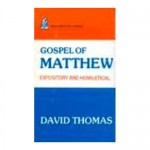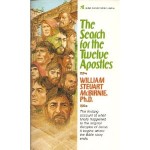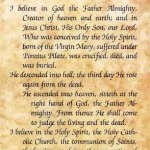Church Gatherings – History of Interpretation
I’m about to begin an exciting aspect of my dissertation research: history of interpretation. For those who are new to my blog, I’m currently writing a dissertation (for a PhD) on the topic of the gathering of the church in the New Testament. One chapter of that dissertation will cover the history of interpretation and understanding of the meeting of the church.
The chapter will cover five broad historical eras: post-apostolic age, medieval age, Reformation age, and modern age.
I’ve already completed some research for this chapter, but I have much more to research. So, don’t be surprised if you find some quotes and snippets showing up on my blog.
Which historical era do you think will be the most interesting when it comes to studying church gatherings?
David Thomas on the Meaning of ekklesia
David Thomas (1813-1894) first published his commentary on The Gospel of Matthew at the end of the nineteenth century. I ran across this commentary in my research for my dissertation.
In his comments on Matthew 18:15-20, Thomas begins by defining the Greek term á¼ÎºÎºÎ»Î·ÏƒÎ¯Î± (ekklesia – normally translated “church”). He defines the term here because it is one of only two occurences of the term á¼ÎºÎºÎ»Î·ÏƒÎ¯Î± (ekklesia) in any of the four Gospels.
Here are his comments:
It seems necessary, at the outset or our endeavour to reach and develop the spirit of this passage, to get a clear and a definite idea of the thing which Jesus here designates á¼ÎºÎºÎ»Î·ÏƒÎ¯Î± —the church. It is scarcely necessary to remark that the simple meaning of the word is an assembly… The term is never used to designate a building, a class of religious functionaries, or a system either of doctrine or of worship. In the Christian sense it means nothing more than an assembly of Christians. The assembly may be large or small, held in a city or a village, in a public building or in the open air. (pg 359) (italics in original)
The more I read older commentaries, the more I find comments and definitions like this. As a definition of á¼ÎºÎºÎ»Î·ÏƒÎ¯Î± (ekklesia), “assembly” is much better than “called out ones,” which relies primarily on etymology instead of usage.
Searching for the Twelve
I’m currently reading (among other things) The Search for the Twelve Apostles by William Steuart McBirnie. (FYI… this book was given to me by Eric from “A Pilgrim’s Progress” before his family moved to India, but I’m only just not getting around to reading it.) McBirnie is searching Scripture, other documents, and traditions to determine what happened (as well as can be determined) to the twelve apostles after the accounts of them in Scripture.
In his introduction, he writes the following:
The Twelve Apostles were important to the thinking of the early Christians, but were not considered be more than leaders, brothers and dearly beloved friends at first. We look upon them as the founders of churches. It took some time for their spiritual descendents to see them as the Fathers of the whole church movement. Their authority at first was in the anointing of the Holy Spirit, not in ex cathedra pronouncements on doctrine.
True, the first council of Apostles in Jerusalem gave authoritarian pronouncements concerning the admittance of the Gentile converts into the Christian movement. Yet this did not seem to have the ecclesiastical authority then that we attach to it now. We could, in face, wish there had been more pronouncements; say, concerning heresy, forms of church government, social matters, etc. But there was nothing much that came collectively from the Apostles. They simply proclaimed individually what they had heard from Jesus Christ. (pg 15-16, italics in original)
While I didn’t know what to expect from this book, I am excited about beginning with the quote above. I agree completely with the author. The “ecclesiastical position” that is given to the apostles is anachronistic – meaning, it came after they had lived and died.
In Scripture, the apostles refer to themselves as servants, brothers, or co-workers. Any authority that others attempted to give to them, they returned to all believers. They were not interested in created great organization, but in building maturing disciples of Jesus Christ.
However, as the years progressed, Christians that followed after them began to add more and more pomp and circumstance to the role of the twelve apostles.
It is going to be very interesting to see how McBirnie’s book progresses from this beginning. I’m greatly challenged by the thinking of the twelve apostles as brothers and dear friends, and leaders certainly, more mature than me and urging me on to the same level of maturity (and beyond).
What do you think of McBirnie’s statement above?
(By the way, Eric, now that you’re back in the States, you can have this book back… once I finish reading it.)
The Silence of the Lambs
One of the earliest creeds created by Christians (besides “Jesus is Lord”) is the Apostles’ Creed:
1. I believe in God, the Father almighty, creator of heaven and earth.
2. I believe in Jesus Christ, his only Son, our Lord.
3. He was conceived by the power of the Holy Spirit and born of the Virgin Mary.
4. He suffered under Pontius Pilate, was crucified, died, and was buried.
5. He descended into hell. On the third day he rose again.
6. He ascended into heaven and is seated at the right hand of the Father.
7. He will come again to judge the living and the dead.
8. I believe in the Holy Spirit,
9. the holy catholic Church, the communion of saints,
10. the forgiveness of sins,
11. the resurrection of the body,
12. and life everlasting.
Amen.
Apparently, the earliest (extant) written version of the creed comes from around 390 AD. However, many believe that this creed is much older, perhaps dating to the second century.
Thus, this statement was written and used by many early Christians at a time when the church was discussing and arguing about many different things. Now, one of those arguments concerned the nature of Jesus Christ and his relationship with God, which is covered by the creed.
But, there were other discussions, arguments, and disagreements as well: baptism, communion (eucharist), bishops/pastors/elders/deacons/etc., and on and on. However, these items did not find their way into the earliest of creeds.
Why do you the earliest creeds did not include some of these items? Why do you think they only focused on the few key aspects listed above? Why do you think modern day creeds and confessions go into much more detail?
Stand firm and do good – Polycarp
Here’s a challenging passage from Polycarp written to the church in Philippi sometime in the early second century:
Stand fast, therefore, in these things, and follow the example of the Lord, being firm and unchangeable in the faith, loving the brotherhood, and being attached to one another, joined together in the truth, exhibiting the meekness of the Lord in your intercourse with one another, and despising no one. When you can do good, defer it not, because “alms delivers from death.” Be all of you subject one to another, having your conduct blameless among the Gentiles,” that you may both receive praise for your good works, and the Lord may not be blasphemed through you. But woe to him by whom the name of the Lord is blasphemed! Teach, therefore, sobriety to all, and manifest it also in your own conduct. (Polycarp to the Philippians 10.1-3)
I think this would be good for all believers and churches to ponder.
Hurtado on Christendom
Back in the day (about 5 years ago) when I was investigating various Ph.D. programs (actually considering potential Ph.D. mentors), I considered studying under Larry Hurtado… assuming he would accept me… and assuming that the University of Edinburgh would accept me as a student. I had read several of his books (and we exchanged a few emails) and I was greatly encouraged and challenged by him.
Not long ago, Hurtado began blogging, at “Larry Hurtado’s blog” no less. Last week, he published a few blog posts concerning his recent trip to China. In one of those posts (“Early Christian Negotiated Existence“), he wrote a little about his views of Christendom. This is what he wrote:
In the Western nations where Christendom once was dominant, it is dominant pretty much no more. I for one don’t grieve this one bit. I regard “Christendom†as a morally dubious phenomenon that probably did as much harm to the gospel as it ever did any good. It consisted more in the promotion of institutional power of churches and church officials. It may have had some effect in shaping professed public morals, and perhaps even some effect on moral practice. But I don’t like the idea of any religion being able to exercise social coercion, and I think that religious faiths should live or die solely by their ability to commend themselves to the consciences of people…
So, I find pre-Constantinian Christianity much, much more exciting than what comes later, with much more to say to churches, Christians, and non-Christians too in our modern era in which Christianity is essentially one religious option in a religiously plural world. If Christians want to figure out how to be authentic and particuarly Christian while also negotiating their contributions to the wider society, it’s Christians and texts from the first three centuries that provide the best resources.
I’ve come to very similar conclusions. So, while I’m glad that I made the choices of Ph.D. program and professor that I made, I think it would have been very interesting working with Hurtado.
We Have A Short Memory
When it comes to our church traditions, beliefs, and practices, people tend to have a short memory. We believe that whatever has occurred in our lifetime – or our “church time” – must have occurred through all of the history of the church.
I remember when I first realized this. When we were discussing leadership for our church, we started talking about “elders.” Of course, coming from a Baptist tradition, most of the people used the term “pastors” and “the pastor.” Someone said, “We’re not Presbyterians. We don’t have elders; we have pastors.”
I scratched my head at that statement. Why? Because I knew that historically Baptists had used the terms “pastor,” “elder,” and “bishop” interchangeably. In fact, the London Baptist Confession of 1689 used all three terms, preferring “elder” or “bishop.” The Baptist Faith and Message of 1925 (the earliest confession of our own denomination) used only the terms “elders” and “bishops.”
But, the people who were part of our church only knew about the term “pastors.” Since that was the only terms they had heard, they assumed it was the only terms that could be used.
Of course, this doesn’t only apply to what we call pastors/elders/bishops. Did you know that Sunday School only started (at the earliest) in 1751 in England? And, it wasn’t started to teach people Scripture; it was started to teach children living in slums how to read so that they would not become criminals. That’s a far cry from modern Sunday Schools, isn’t it? But could you imagine suggesting a Sunday School that didn’t teach the Bible or Christian doctrine, or Christian living? Why can we not imagine that? Because we have a short memory, and we assume that what we’ve experienced is the way it’s always been done and the way it should always be done.
What about Youth ministry? Surely the first Youth ministry was started by Peter or Paul, right? No. Actually, youth ministry did not start until the industrial revolution (late 1800s to early 1900s) as a way to provide community support for young people who moved away from the farms (and their home town community support) to be near the factories. Youth ministry kicked it up a notch in the 1940s and 1950s to help servicemen returning from World War II. (But, note, these were not primarily teenagers, but people in their early twenties.)
So, why can we not imagine a church without a youth ministry? Because that’s the way we’ve always seen it done, and so that must be the way it’s supposed to be. We have a short memory.
You could say the same for our “traditional” hymns, which tend to be only a couple of hundred (at most) years old. Or traditional church instruments. Or so many other beliefs, programs, and activities of the church. In many cases, we don’t realize that what we’re doing or what we believe is a relatively new invention or creation. (Note, this does not mean that these things are bad in and of themselves.)
It’s true. We have a short memory. Typically, our memory only reaches as far back as our own experiences.
But, the church should never be based on our experiences… or our traditions, for that matter. The church is much more than that. Perhaps, this is why I love to look at the church in Scripture so much. In those images and stories and encounters and corrections and instructions, we find a beautiful picture of a timeless community built around the continued presence and work of Jesus Christ.
When we focus on the church from a scriptural perspective and on the presence and work of Jesus Christ, our memory gets much, much better.
You’ve Been Charged
We’re part of a homeschool co-op with a few other families. History is one of the subjects that we do as a co-op. Last year, we studied ancient history with the children reading Homer, Herodotus, Plutarch, Plato, Socrates, and others.
This year, they are studying medieval history, beginning with Constantine and working their way to the Renaissance and the Reformation. They’ll read Beowulf, The Rule of St. Benedict, Confessions, The Song of Roland, The Canterbury Tales, Macbeth, and other books, stories, and plays written during that time period.
They started by reading The Church History by Eusebius. Eusebius (as with all authors) has an agenda for writing his history which he states at the beginning of his book. His primary goal is to prove succession from the apostles to the bishops of his day.
However, he has another goal: listing many of the people who died because they professed Christ.
Interestingly, many of these martyrs did not die because they believed that Jesus Christ was divine or that he was raised from the dead. Instead, some were charged with crimes against the state and humanity.
What kinds of crimes? Well, crimes like cannibalism, incest, and atheism. Now, obviously, those early Christians were not cannibals. But, the people around them thought they were cannibals. Similarly, they were not practicing incest nor were they atheists. But, their neighbors thought they were. Why?
This week, my children have to pick one of the three crimes listed above and indicate how they would defend themselves against the charge.
I think this is an excellent exercise. First, it forces them to think about what they believe. Then, it forces them to think about how to explain what they believe to other people in a manner that they will understand.
What about you? Could you defend yourself from a charge of cannibalism, incest, or atheism in a manner that your friends, neighbors, and co-workers would understand? Wanna try it?
Anabaptists on the Reformation Preacher
After publishing “Things I Didn’t Learn in Baptist History Class,” I became even more interested in the source of the quote on that post. It turns out that the quote is from a Swiss Anabaptist pamphlet from 1532-1538, very early in the Reformation. You can find it in the article “Answer of Some Who Are Called (Ana-)Baptists – Why They Do Not Attend the Churches†by Shem Peachey and Paul Peachey. (Mennonite Quarterly Review 45 (Jan 1971), 5-32)
As I was reading through this pamphlet (which we only have because it was copied by one of their detractors), I noticed that the original authors did not stop at encouraging mutual edification during the church meeting. They also spoke against the practice of one person speaking, especially when the only person allowed to speak is an ordained minister:
And thus, as already mentioned, they [primarily Lutherans and Zwinglians] deny that we possess the evangelical order nor would they permit us to exercise it (if we did attend their preaching), but teach and presume that we also, as those who err, should remain silent in their preaching regardless of what we would have to speak to edification whether or not their preacher defaults from the truth, one must be silent, even though according to 1 Cor. 14 the listeners must judge the preacher’s doctrine. All judgment and everything, yes everyone in his conscience, is bound to the preacher and to his teaching, whether it be good or evil (to accept the same in conscience to believe and to do), and not the teaching of Christ and of his Holy Spirit. (12)
Later, the writers say that requiring everyone but the preacher to remain silent “annuls, transgresses and resists… yes, forbids and then also frustrates and impedes the rivers of living water.”
When most churches practice that only the pastor (or his representative) can speak during the church meeting, I do not think they intentionally do what the Anabaptists claim. Usually, its probably a matter of tradition and pragmatism.
But, were the Anabaptists correct? When we silence everyone (except one) do we hinder the work of God?
What do you think?
Things I Didn’t Learn in Baptist History Class
In the 16th Century, many magesterial Reformers could not understand why the Anabaptists would not attend their church meetings. So, some Swiss Anabaptists wrote a response. In Baptist History class, I learned about many of the Anabaptists’ concerns – such as believers’ baptism. But, I never heard this:
When such believers come together, ‘Everyone of you (note every one) hath a psalm, hath a doctrine, hath a revelation, hath an interpretation,’ etc…When someone comes to church and constantly hears only one person speaking, and all the listeners are silent, neither speaking nor prophesying, who can or will regard or confess the same to be a spiritual congregation, or confess according to 1 Corinthians 14 that God is dwelling and operating in them through His Holy Spirit with His gifts, impelling them one after another in the above-mentioned order of speaking and prophesying. (From “Answer of Some Who Are Called (Ana-)Baptists – Why They Do Not Attend the Churches”)
Interesting…
(HT: Jon)










